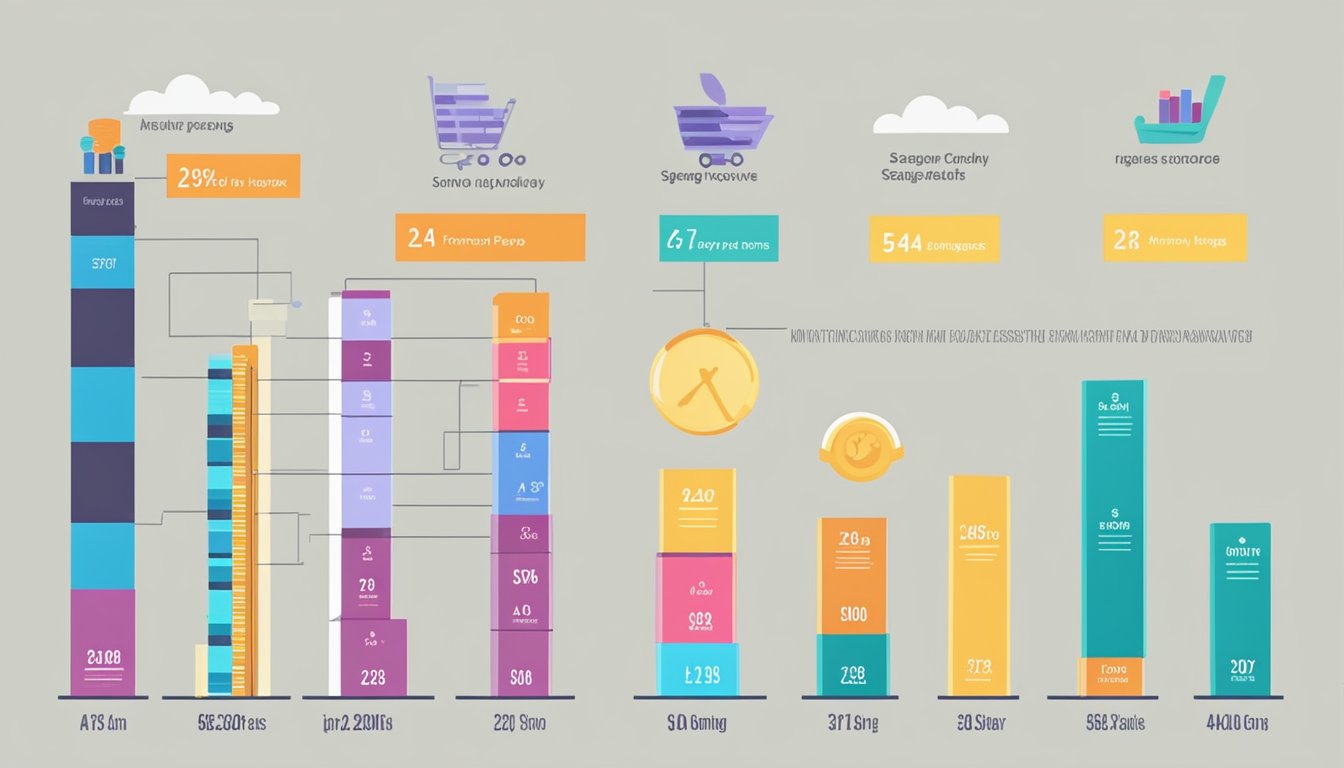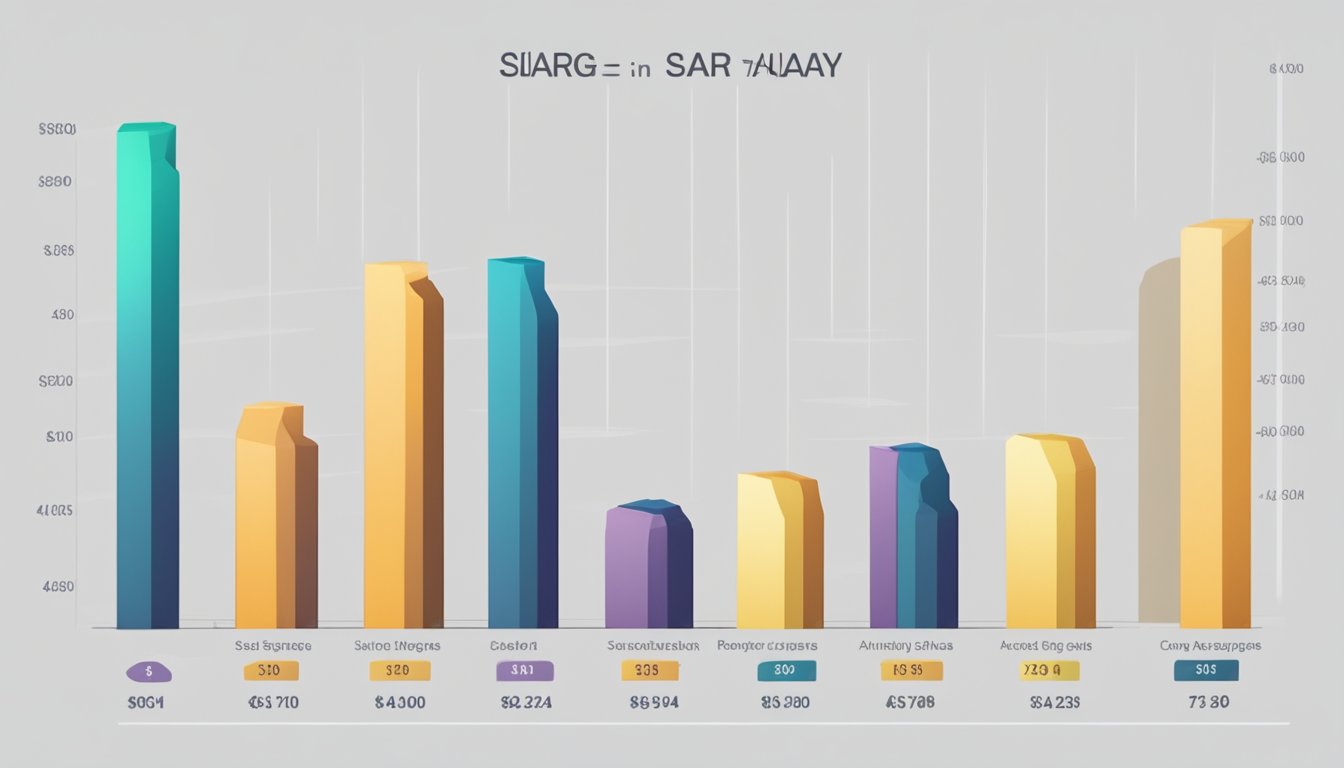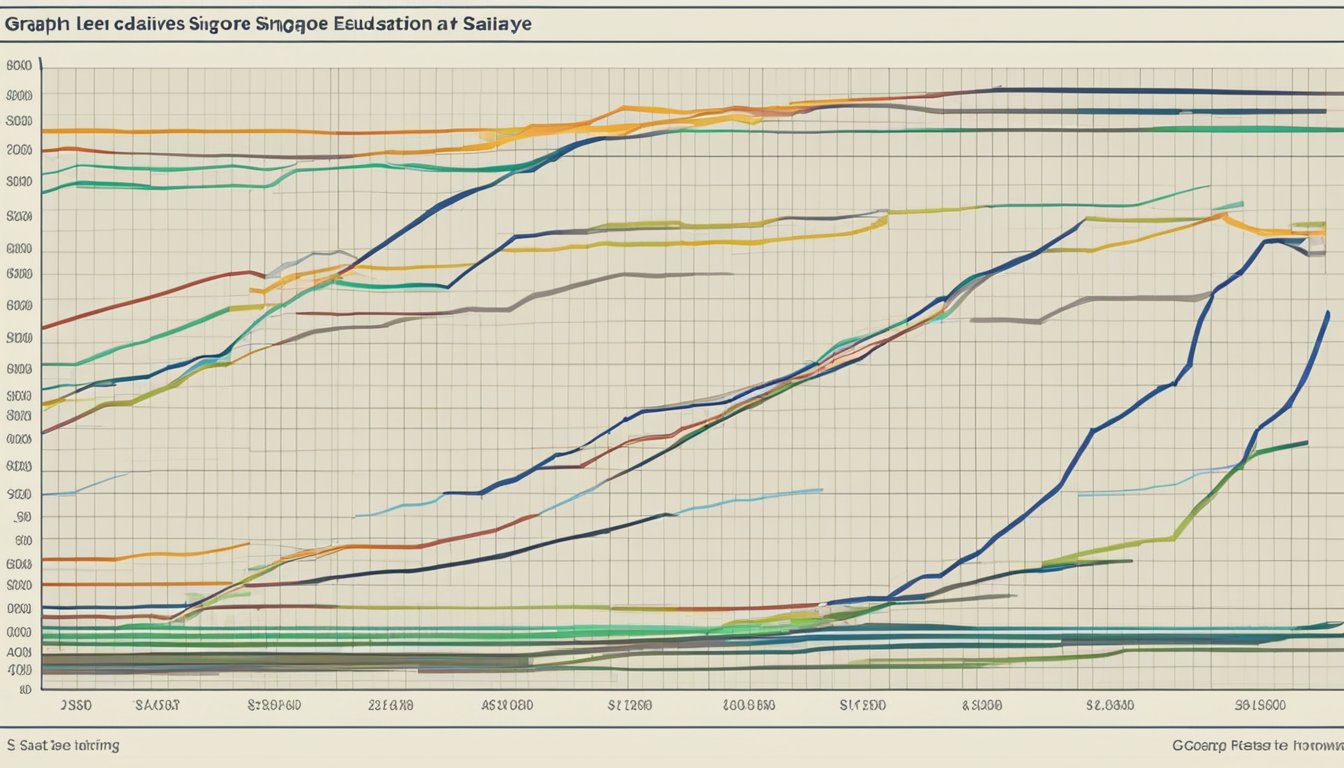Are you curious about the average salary in Singapore? This bustling city-state is known for its vibrant economy, excellent infrastructure, and high standard of living. As such, it’s no surprise that many people are interested in finding out what the typical salary is for those living and working in Singapore.

According to recent data, the average monthly income in Singapore is around S$6,254 per month, including CPF contributions from employers. This figure varies depending on factors such as age, experience, and industry. For example, those working in the finance sector tend to earn higher salaries than those in the retail or hospitality industries. Additionally, the cost of living in Singapore can be quite high, so it’s important to take this into account when considering salaries.
Whether you’re a local looking to gauge your earning potential or an expat considering a move to Singapore, understanding the average salary in this city-state is an important piece of information. Keep reading to learn more about what you can expect to earn in Singapore, and how this compares to other countries around the world.
30 Sec Read
Curious about the average salary in Singapore? This bustling city-state offers high salaries, but it can vary depending on experience, industry, and age.
Here’s a quick snapshot:
- Average monthly salary: S$6,254 (including employer CPF contributions)
- Median monthly salary: S$4,563 (full-time employed Singapore residents)
- Salary range by age group: S$3,500 (25-29 years old) to S$6,000 (50-54 years old)
Remember, this is just a general overview. To get a more accurate idea of what you might earn, research salaries in your specific industry and with your level of experience.
Understanding Salaries in Singapore

If you are looking to work in Singapore, it is important to understand the salary structure and components of salaries in the country. This information will help you make informed decisions when negotiating salaries with your potential employer.
Components of Salary
The salary in Singapore is made up of several components, including basic wages, other allowances, overtime pay, commissions, tips, and one-twelfth of annual bonuses. The basic wage is the fixed amount paid to an employee for their work. Other allowances include housing, transport, and food allowances, and may vary depending on the company and job role.
Overtime pay is paid to employees who work beyond their normal working hours. Commissions and tips are common in sales and service industries, and are paid based on the amount of sales or service provided. One-twelfth of annual bonuses is a common practice in Singapore, where employers pay a portion of the annual bonus every month.
Salary Structure for Different Job Roles
The salary structure in Singapore varies depending on the job role and industry. According to statistics from Singapore, the average monthly salary in Singapore in 2024 is projected to be around S$7,310 per month. However, the salary can vary widely depending on the industry and job role.
For example, according to SingSaver, the median gross monthly salary in Singapore for all full-time workers was S$5,197 in 2023. This includes employer CPF contributions. The salary can also vary depending on the level of experience and education of the employee.
Statistical Overview of Salaries

Are you curious about the average salary in Singapore? The Manpower Research & Statistics Department (MRSD) of the Ministry of Manpower has released data on the income distribution of the labour force in Singapore. Here’s what you need to know:
Average and Median Salary
According to the MRSD, the average monthly income in Singapore as of 2024 is approximately S$7,310. This figure takes into account both full-time and part-time employees, as well as the self-employed. However, it is important to note that this is an average, and salaries can vary significantly depending on factors such as industry, experience, and education.
The median gross monthly income, which is the midpoint of all salaries, is currently S$4,563 for full-time employed Singapore residents. This means that half of all workers earn less than S$4,563, while the other half earn more. It is worth noting that this figure includes employer CPF contributions.
Income Distribution by Age Group
The MRSD has also provided data on the income distribution of different age groups in Singapore. In general, salaries tend to increase with age and experience. As of 2024, the median gross monthly income for residents aged 25 to 29 is S$3,500, while those aged 50 to 54 have a median gross monthly income of S$6,000.
Here is a table that summarises the median gross monthly income by age group:
| Age Group | Median Gross Monthly Income |
|---|---|
| 15-19 | S$1,500 |
| 20-24 | S$2,500 |
| 25-29 | S$3,500 |
| 30-34 | S$4,500 |
| 35-39 | S$5,000 |
| 40-44 | S$5,500 |
| 45-49 | S$5,800 |
| 50-54 | S$6,000 |
| 55-59 | S$5,500 |
| 60-64 | S$4,500 |
| 65 & above | S$3,500 |
Legal Aspects of Salary

If you are working in Singapore, it is important to know the legal aspects of salary. This includes employer CPF contributions, employee CPF contributions, and personal income tax.
Employer CPF Contributions
Employers in Singapore are required to contribute to the Central Provident Fund (CPF) of their employees. The CPF is a social security savings plan that helps Singapore citizens and permanent residents save for retirement, healthcare, and housing. The employer CPF contribution rate is currently 17% of the employee’s monthly salary, with a cap of SGD 6,000 per month.
Employee CPF Contributions
As an employee in Singapore, you are also required to contribute to your CPF. The employee CPF contribution rate is currently 20% of your monthly salary, with a cap of SGD 6,000 per month. Of this, 17% goes towards your Ordinary Account (OA), which can be used for housing, while the remaining 3% goes towards your Special Account (SA) or MediSave Account (MA).
Personal Income Tax
In addition to CPF contributions, you are also required to pay personal income tax in Singapore. The tax rates vary depending on your income level and tax residency status. Singapore citizens and permanent residents are taxed on their worldwide income, while foreigners are taxed only on income earned in Singapore.
For the tax year 2024, the personal income tax rates for residents are as follows:
| Taxable Income | Tax Rate |
|---|---|
| First SGD 20,000 | 0% |
| Next SGD 10,000 | 2% |
| Next SGD 10,000 | 3.5% |
| Next SGD 40,000 | 7% |
| Next SGD 40,000 | 11.5% |
| Next SGD 40,000 | 15% |
| Next SGD 40,000 | 18% |
| Next SGD 40,000 | 19% |
| Next SGD 40,000 | 19.5% |
| Above SGD 320,000 | 20% |
It is important to note that Singapore has a progressive tax system, which means that the more you earn, the higher your tax rate will be.
In conclusion, understanding the legal aspects of salary in Singapore is crucial for both employers and employees. By knowing the CPF contribution rates and personal income tax rates, you can better manage your finances and plan for your future.
Pro Tip: Don’t Just Look at Average Salary in Singapore!
While Singapore boasts an average monthly income of S$6,254, remember – this is just an average! Understanding salary variations across industries is key. Finance and tech sectors offer much higher figures, while retail or hospitality might be lower. Do your research to see what your specific field pays!
Industry-Specific Salary Insights

If you are looking for industry-specific salary insights, you have come to the right place. In Singapore, the average salary varies depending on the industry you are in. Here are a few subsections about some of the most popular industries in Singapore and the average salary for some of the roles within those industries.
Business and Finance
The business and finance industry is one of the most popular industries in Singapore. If you are looking for a career in this industry, you can expect to earn a good salary. Some of the roles in this industry include accountant, financial analyst, and investment banker. According to Michael Page, the average salary for an accountant is S$80,000 per annum, and the average salary for a financial analyst is S$100,000 per annum.
Technology and Project Management
The technology industry is growing rapidly in Singapore, and there is a high demand for professionals in this industry. If you are a project manager or a software engineer, you can expect to earn a good salary. According to Michael Page, the average salary for a software engineer is S$130,000 per annum, and the average salary for a project manager is S$120,000 per annum.
Sales and Trade
If you are looking for a career in sales or trade, you can expect to earn a good salary in Singapore. Some of the roles in this industry include sales manager, business development manager, and marketing manager. According to Michael Page, the average salary for a digital marketing manager is S$137,000 per annum, and the average salary for a sales manager is S$120,000 per annum.
Overall, the salary you can expect to earn in Singapore varies depending on the industry you are in. However, if you are in one of the industries mentioned above, you can expect to earn a good salary.
The Job Market in Singapore

Employment Trends
If you’re looking for a job in Singapore, you’re in luck! The job market in Singapore is healthy, and there are plenty of opportunities for both locals and foreigners. In fact, according to MyCareersFuture, Singapore’s job market is projected to remain stable in the coming years.
However, it’s worth noting that there are some headwinds on the horizon for Singaporean employees and jobseekers. Global inflation and economic factors are causing Singapore’s labour market to slow down. Despite this, there are still plenty of job opportunities available across various industries.
Job Opportunities for Singapore Residents
If you’re a Singapore resident looking for full-time work, you can expect to earn an average monthly salary of around S$4,563, including employer CPF contributions, according to ResumeWriter. However, the average monthly salary varies depending on the industry and job role.
There are also opportunities for self-employed persons in Singapore. If you’re interested in starting your own business, you can expect to earn an average monthly profit of around S$6,000, according to SmartWealth. However, it’s important to note that starting a business can be risky, and there are no guarantees of success.
The Impact of Education on Salaries

Education plays a significant role in determining salaries in Singapore. Generally, the higher the level of education, the higher the salary. According to a report by the Ministry of Finance, Singaporeans with post-secondary qualifications earn more than those with lower qualifications.
In Singapore, employees with a bachelor’s degree earn 24% more monthly wages than diploma holders. And professionals with a master’s degree will make 29% more than workers who have finished their bachelor’s degree, according to a salary guide. Therefore, it is clear that investing in higher education can lead to higher salaries in Singapore.
Moreover, the occupation one holds within a sector can also greatly affect the average salary you receive in Singapore. For example, managers earn an average of $10,068, professionals earn an average of $7,722, and support workers earn an average of $3,276, according to SmartWealth.
It is essential to note that the type of degree or qualification also plays a significant role in determining salaries. For instance, graduates with a degree in Accountancy earn a median gross monthly salary of $4,500, according to the Ministry of Education’s Graduate Employment Survey (GES) 2023 report. However, the mean gross monthly salary of Bachelor of Accountancy graduates is relatively similar to the median gross monthly salary. Therefore, it is crucial to choose a degree or qualification that matches your career goals and aspirations.
Frequently Asked Questions

What does an average monthly wage look like for different age groups in Singapore?
The average monthly wage in Singapore varies according to age groups. According to SmartWealth.sg, Singaporeans aged 25-29 earn an average of S$3,783 per month, while those aged 30-34 earn an average of S$4,200 per month. The average monthly wage increases with age, with those aged 60 and above earning an average of S$5,000 per month.
How much does the typical foreign worker earn in Singapore?
The typical foreign worker in Singapore earns an average salary of S$2,500 per month, according to Morgan McKinley. However, this varies depending on the industry and job position.
In terms of industries, which ones offer the best average salaries in Singapore?
The industries that offer the best average salaries in Singapore are finance, information technology, and healthcare, according to ResumeWriter.sg. These industries have a high demand for skilled professionals, which drives up the average salaries.
What’s considered a smashing salary to live comfortably in Singapore?
To live comfortably in Singapore, you should aim for a salary that allows you to cover your basic needs, such as housing, food, and transport, while still having enough left over for savings and leisure activities. According to SingSaver, a salary of S$6,000 to S$8,000 per month is considered a “smashing” salary that allows for a comfortable lifestyle.
Could you tell me the average income bracket for Singapore’s middle class?
The income bracket for Singapore’s middle class varies, but according to MyCareersFuture.gov.sg, the median gross monthly salary for full-time permanent jobs in Singapore is S$3,800 as of 2021. This means that the middle class in Singapore would typically earn between S$3,000 to S$6,000 per month.
Is earning 10,000 SGD a month considered a top-notch salary in Singapore?
Earning S$10,000 per month in Singapore is considered a high salary, but whether it is considered “top-notch” depends on the industry and job position. According to Morgan McKinley, the average salary in Singapore is around S$70,000 per year, which translates to S$5,783 per month. However, salaries in certain industries, such as finance and technology, can be much higher.
Applying for Loans Just Got Easier with Quick Credit
Do rising living costs or unexpected expenses leave you feeling strapped? A personal loan can bridge the gap, whether you’re dreaming of a vacation or need the latest tech.
Quick Credit, a reputable Jurong moneylender, streamlines the process. Our simple online application takes mere minutes, and you’ll know your decision quickly.
Take Control of Your Finances Today
Get a personal loan quote without hassle. Click here to apply with Quick Credit and breathe easier.
